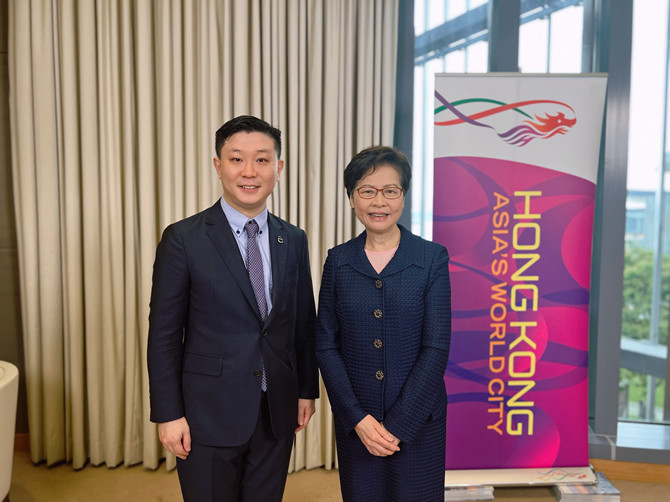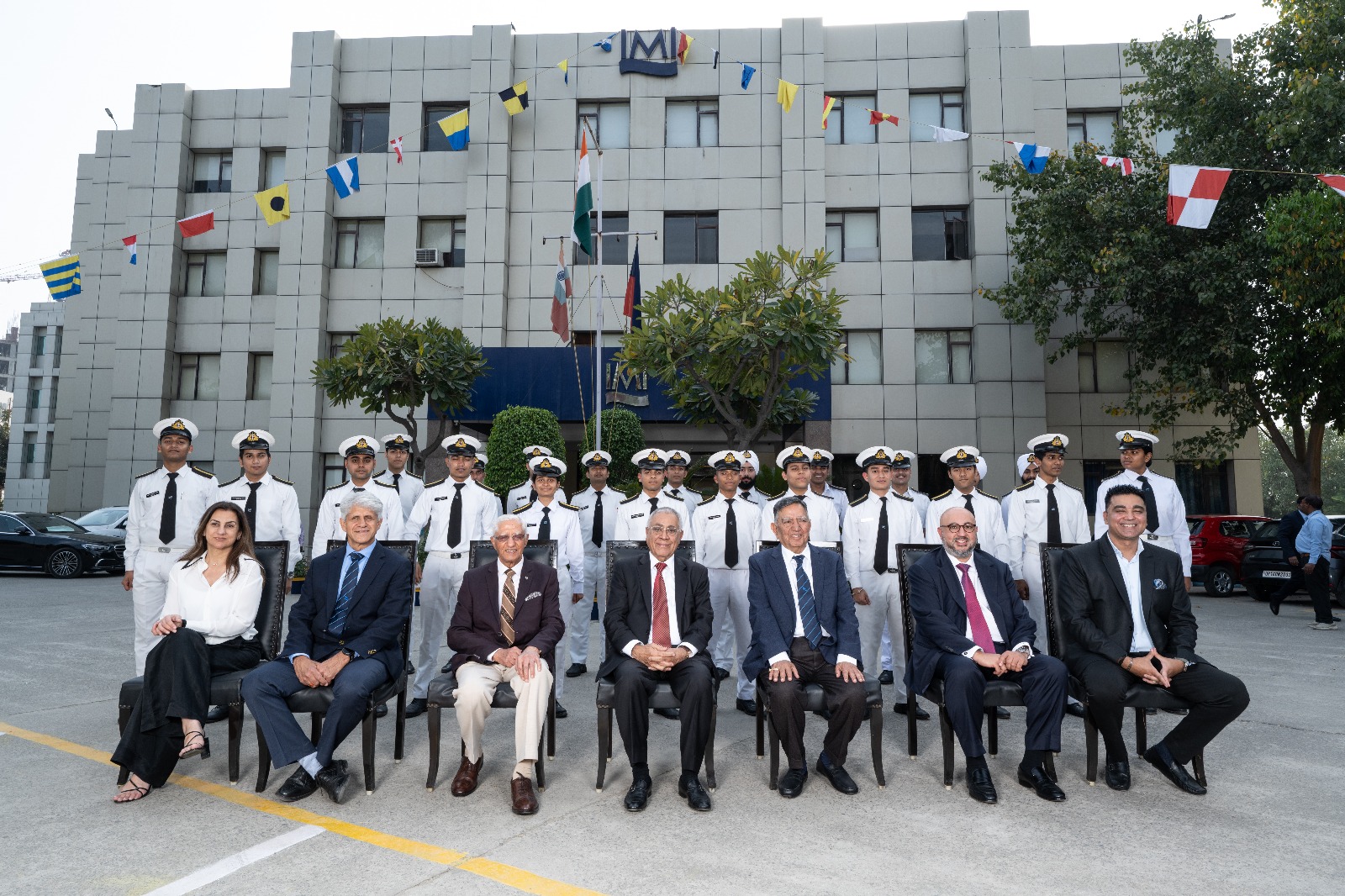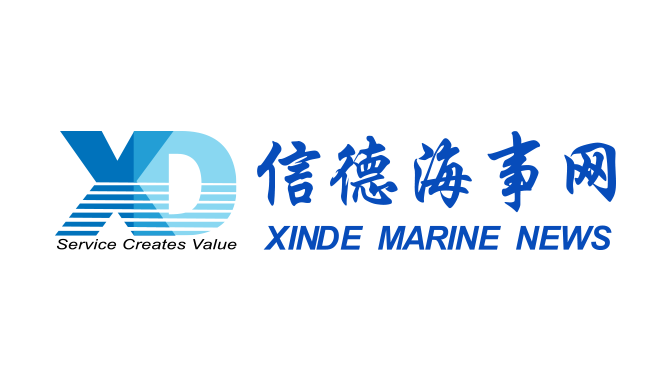The year 2022 marks the 25th anniversary of Hong Kong's reunification with Mainland China, which coincides with the centenary anniversary of the founding of the International Chamber of Shipping (ICS). To celebrate the 25th Anniversary of the Establishment of the HKSAR, to ring in the ICS Centenary Dinner on 20 June, and to build a better understanding of the historical development and future opportunities presented to the HKSAR's maritime industry, Edward Liu, the Principal Representative of the International Chamber of Shipping (China) Liaison Office, interviewed the Chief Executive of the HKSAR, Ms. Carrie Lam Cheng Yuet-ngor, on 25 April at the Chief Executive's Office.

Edward Liu, Principal Representative of International Chamber of Shipping (China) Liaison Office:How has shipping in Hong Kong transformed in economic and cultural terms over the past 100 years from your perspective?
Carrie Lam Cheng Yuet-ngor, Chief Executive of the Hong Kong Special Administrative Region (HKSAR): If I may, let us start from the global sea. With increased globalisation, efficient flow of goods is very important. It supports economic activities. It serves people's daily necessities and so on. According to data from the United Nations Conference on Trade and Development's Review of Maritime Transport and the International Chamber of Shipping, the international shipping industry is responsible for almost 90% of the volume of world trade in goods, so it is a very important part of the global economy. For Hong Kong, as we are the world's sixth largest merchandise trading entity, this efficient flow of cargo goods, be it for imports, exports or re-exports, is very important to us. Hong Kong has a very strong maritime heritage, dating back to over 150 years. And over the years, I would say that the Hong Kong port has served Hong Kong very well at various stages. Initially when we performed the role of an entrepot, the container port worked very well in strengthening our economy; and then when we transformed ourselves into a service economy, the maritime part continued to be very important, leveraging Hong Kong's strength in terms of the rule of law, arbitration, legal services, finance and so on. So I would say that maritime remains a very important pillar in Hong Kong's economy. And that's why in the last five years, in this term of Government, when we have so many things to do in terms of innovation, technology, arts and culture, we have never forgotten about the maritime side. We will continue to grow Hong Kong into an international maritime centre.
Liu: How important is shipping to the global economy today and why from your view?
Lam: The world has suffered from over two years of the COVID-19 pandemic, and it is during such a difficult period that we have experienced a shortage of goods because of the public health disruptions that have happened to the port, and also to the ships and liners. That's why it is even more important in terms of making the ports all over the world as efficient and as safe as possible, so that the flow of goods into the economy of every state and serving the daily necessities of the people could be maintained even at times of crises. We are seeing this public health crisis. I hope we are not seeing the crisis of other nature because that will be a major trauma to people all over the world.
Liu: Could you please elaborate further on why you think the future of shipping can continue a positive role in Hong Kong and explain further its role, in Hong Kong's position as a super-connector for the country?
Lam: Let me express my thanks to the local shipping sector and also to the International Chamber of Shipping for giving us this recognition. During my term, I was particularly proud of the two international recognitions that you have just mentioned. One is to be chosen as the first ever overseas office of the International Chamber of Shipping, especially as that happened in 2019 when Hong Kong was suffering from the riots. I still remember I welcomed the ICS president to Hong Kong, and thanked him personally for the vote of confidence in Hong Kong despite the disruptions and violence that were happening then in Hong Kong. The second achievement was from the BIMCO in giving us the status as one of the four designated arbitration centres alongside London, New York and Singapore. Those two international recognitions did not come easily because they reflect a lot of hard work by the Government, by the industry players and also by other people, for example, our legal profession; otherwise, we would not have been given this arbitration status.
Looking ahead, I am very optimistic because of several important missions we have given ourselves. One is of course in the National 14th Five-year Plan. The Central Government continues to accord significance to Hong Kong’s transportation centre or international transportation centre. In the 14th Five-year Plan, for the first time, we actually managed to secure a split in transportation. We were given support in being an international transportation centre and also an international aviation hub. So when aviation is split from transportation, it means transportation is predominated by maritime and shipping. This is the first thing.
Secondly, we have just passed the third anniversary of the publication of the Outline Development Plan for the Guangdong-Hong Kong-Macao Greater Bay Area. As you know, the Greater Bay Area is a huge economic entity with a population of 86 million, and a total GDP of US$1.6 trillion, which is bigger than the whole of South Korea or Australia. And it has a very strong maritime sector within the Greater Bay Area's several ports, like Shenzhen port and Nansha port. Of course, these ports pose competition to Hong Kong, but they also bring businesses to Hong Kong, especially because of Hong Kong's strengths in maritime services.
The third is something that we have not highlighted previously, it is our strategic location. I am sure many people have heard about the western part of the country, where they have been developing, for several years now, a new corridor which is a combination of land and sea, so all the way from Gansu, Chongqing, Sichuan, Guizhou, Guangxi, the goods will be brought along the rail to the Guangxi port. The Guangxi port, given its scale, needs a transshipment port in order to take the goods to all over the world, and Hong Kong stands out as one of the best transshipment ports for this new western corridor because, at the moment, 60% of our cargo throughput is already transshipment.
With these three major national developments, I feel that Hong Kong's maritime will have a very bright future. What we need to do now is to continue to raise the Hong Kong port's visibility in the global arena. We will continue to do more in boosting Hong Kong's shipping registry. In my term, we have already set up seven regional desks of the registry in different parts of the world. We will continue to set up more, so that our shipping registry will provide better services to our customers. We will continue to do more in manpower training and talent scouting. More importantly, it is also to contribute to my pledge that Hong Kong should reach carbon neutrality by 2050, so decarbonisation of the shipping fleet and growing a green port as well as a smart port are also very important initiatives for Hong Kong in the coming years.
Liu: What key challenges does the shipping industry face and how can these challenges be overcome in terms of decarbonisation in Hong Kong?
Lam: I proposed in 2020 that Hong Kong will strive to achieve carbon neutrality by 2050, and further announced the goal of cutting down our carbon emissions to half of the 2005 level by 2035. In order to reach carbon neutrality, there are lots of things that we have to do. And shipping plays a very important part because of the importance of our port, so we have to embark on the use of alternative fuels. We have to use more technology to turn our port into a smart port, and to go for digitalisation in some of the procedures applied to the port sector. In all these respects, it actually goes very well with the other ambitions that Hong Kong has. As also endorsed in the National 14th Five-Year Plan, one is, of course, we continue our strong position as an international financial centre, hence our issue of green bonds to support some of the initiatives I've just mentioned both in maritime infrastructure and in financing. The second thing is the application of technology. In the last five years, Hong Kong really invested very heavily, over HK$150 billion in innovation technology. And some of our universities' basic research is actually in maritime because of our very good position as one of the world's busiest ports. And thirdly is of course in manpower. I think talent will be one of the biggest challenges for the world, particularly for Hong Kong, so we have devised some policies to attract more talents to Hong Kong and also to attract more STEM scholars to Hong Kong to help in basic research.
All in all, I think together with the industry, which is very well represented by the Hong Kong Shipowners Association, and also under the guidance of the Hong Kong Maritime and Port Board under the Transport and Housing Bureau, I believe that in the coming years, we will be seeing more initiatives on the maritime side. And if I may just add, in my last Policy Address, I have announced the restructuring of our Government bureaux, and one of the major proposals is to split the existing Transport and Housing Bureau into two bureaux – one on transport and logistics, the other on housing. So that will mean that if this idea is endorsed by the next term of Government with the setting up of a dedicated Transport and Logistics Bureau, more attention, more policy steer will be given to the maritime side.

Liu: Please would you elaborate more about the relationship between ICS and the Chinese shipping industry, including the Hong Kong shipping industry, and your expectation of the future collaboration between ICS and Hong Kong shipping industry?
Lam: I wish to send my congratulations to the International Chamber of Shipping. For the past 100 years, this international organisation, which represents over 80% of the shipping associations all over the world, has been playing a very important role both in terms of setting the policies, looking into manpower as well as the technical side; and now with the new challenges of decarbonisation and digitalisation, I am sure the ICS will go from strength to strength. Of course, I would like to see the ICS venturing more into Asia because it is now without a doubt that Asia will be the engine of growth, and particularly with our country, the People's Republic of China, which has been pushing for the Belt and Road initiative. I think shipping will play a very important part in the initiative. With the expertise and experience possessed by the ICS, I am sure that it will be very welcomed by economies and ports in Asia to tap into that expertise in order to develop their maritime industry.
Since you are the first ever overseas office of the ICS, I am sure everybody expects this office, despite being very modest in scale, will be able to play an influential role as a connector and bridge between the ICS headquarters and this part of the world. I am sure the HKSAR Government, both my existing Government and the future Government, will continue to provide all the needed support to this office.
Source: Edward Liu
The opinions expressed herein are the author's and not necessarily those of The Xinde Marine News.
Please Contact Us at:
media@xindemarine.com




 Dr. Harry S. Banga and Mr. Angad Banga of The Carav
Dr. Harry S. Banga and Mr. Angad Banga of The Carav  Liberian Registry Welcomes Kyle Hurst as Senior Vic
Liberian Registry Welcomes Kyle Hurst as Senior Vic  KATALIST: Accelerating Green Shipping through Innov
KATALIST: Accelerating Green Shipping through Innov  Revealing the risks: digital solutions for complian
Revealing the risks: digital solutions for complian  Beibu Gulf Port Chairman Zhou Shaobo Passes Away at
Beibu Gulf Port Chairman Zhou Shaobo Passes Away at  Exclusive Interview with Norsepower CEO: Bringing S
Exclusive Interview with Norsepower CEO: Bringing S